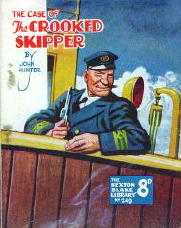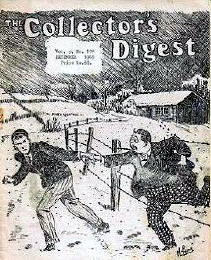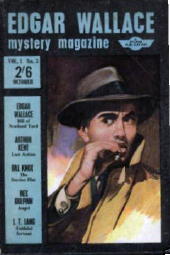Wed 11 Jun 2008
More from KEITH CHAPMAN on Edgar Wallace Mystery Magazine.
Posted by Steve under Collecting , Editors & Anthologies , Magazines1 Comment

I was a reader of the Sexton Blake Library from the age of eight or nine. The first title I read was The Case of the Crooked Skipper by John Hunter. [3rd series, Issue 249, October 1951]
I liked the changes made by editor Bill Baker in 1956 and became an advocate in fan circles, making contributions while still at school to Herbert Leckenby’s Collector’s Digest.
Mid-1961, on the departure of Mike Moorcock from Fleetway, I was offered the chance to become the SBL’s editorial assistant. I jumped at it and enjoyed the first year or so of my working life reading manuscripts and proofs, creating book and chapter titles and blurbs, running the readers’ letters section, keeping editorial ledgers and liaising with the accounts department over payments to contributors. It was an eye-opening experience that quickly gave me a firm grounding for a career in editing and writing.
By the time Fleetway had abandoned the SBL, I was established at Micron Publications Ltd of Mitcham, Surrey, as the editor for a wide range of 64-page comic books of the type popularly known in Britain as picture libraries. In between these duties and writing scripts for the war and western titles, I persuaded the company’s principals that a market existed for a new British text magazine in the mystery field.

This allowed me to approach the Wallace family and their UK literary agents, A. P. Watt, for permission to use the Edgar Wallace name, then still prominently associated with thriller fiction, particularly through the Anglo-Amalgamated B-movie series.
The rights were granted for a fairly nominal sum, and each monthly issue contained a reprint of an otherwise unavailable Wallace novelette or story, backed up with other, all-new fiction by contemporary crime writers, true crime articles, book reviews and readers’ letters. Many of the contributors were ex-SBL. One of the several who wasn’t was Nigel Morland, who professed to be a friend of the Wallace family.
In hindsight, it was a mistake to have involved the Micron company. The firm was in financial difficulties with its publications, stemming largely from a failure to secure adequate distribution and possibly to have re-invested more of their earlier profits. In debt to its printers, Micron handed over the comics business to them on the basis that various series should continue, but only as English-rights reprints of material from a Spanish publisher.
This terminated my employment, but I was to continue to run EWMM for them as a freelance editor. Responding to sudden employment separation, I quickly adapted to the new circumstances and focused on preserving the magazine’s future. In a very short time, Micron decided to axe the magazine altogether and I began a battle to save it, negotiating alternative distribution, while Edgar Wallace Ltd stepped into the breach to act as publishers and meet printing and editorial costs.

I have letters on file from Nigel Morland ostensibly offering me support, telling me how “impressed” he was, how it was “first-class” and “excellent”. But many were written at a time when he must at least have had an eye on taking over my role.
“Dear Keith, I had the new issue, and really do think you are doing it well. You’ve set a standard, and that is a high one. So far you seem to better it a little with each issue, which, after all, is the heart of all really good editing. Congratulations. Every good wish, Yours, Nigel.”
Two months later, in late 1964, after expending a huge amount of time and energy on what had been “my baby” from the outset, I was bluntly informed by agent Peter Watt that Messrs. Edgar Wallace Ltd had appointed a new editor for the magazine and that after issue number six I should no longer be connected with its publication. I should receive an “ex gratia payment of ?50 when the final corrected proofs of No. 6 go to the printer.”
The new editor was to be Morland, whom I was told by Penelope Wallace and her husband, George Halcrow, was older and more experienced than me, and therefore would make a better job of the magazine.
In a reaction typical of the many I received, T.C.H. Jacobs (Jacques Pendower), then a recent chairman of the Crime Writers’ Association, wrote to me: “Their choice of an editor astonishes me. I have known Morland for many years and am unaware he has ever had editorial experience. But I do know that he has always claimed some connection with the Wallace family. Maybe it is true. I don’t know. He is certainly older than you, sixty.”
I was then aged 21, had done a heap of work in the three and a half years since I’d left school and acquired something of a track record in Fleet-street and backstreet offices. Nevertheless, I was very disillusioned and deeply disappointed. Morland took the magazine in what I suppose was intended to be a more literary direction, eschewing the thriller, slightly pulpish tradition that I felt was truer to the Wallace oeuvre.
And it didn’t last.
October 8th, 2009 at 8:58 am
Hi there
I’m an academic currently reseaching Wallace’s fiction. I’m parcticualrly interested in any papers that may have originated from Wallace or his collaborators. if can provides any clues, I’d be grateful
best wishes and keep up the good work
Dr Dave Mann